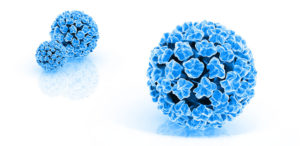High-risk patients
Everybody can develop an HPV-induced tumour. However, there are certain risk factors whose interplay is made responsible for tumour growth.
Life-style factors
- Frequent tobacco consumption (smoking, snuff and chewing tobacco)
- High-level intake of alcohol, especially >30 vol %
Other factors
- Persistent HPV16 infections or a partner with HPV16 infections
- History of treated HPV induced tumour
- Immune deficiency and immune suppression
Frequent tobacco consumption
Smoking increases the risk to develop cancer. It is now known that not only directly applied carcinogens from tobacco can support mutations. Smoking also affects the immune system such as the healthy functioning of the dendritic cells. These cells play a key role in immune defence mechanisms.
Dendritic cells are responsible for presenting viral proteins on their surface to the cytotoxic T cells. This enables the human body to recognise and eliminate the papilloma virus.
In smokers the function of the dendritic cells is reduced which promotes the progression of a persistent HPV infection to malignant cell growth.
High levels of alcohol intake
A study with 1,300 patients in Florida has shown a significantly increased risk of contracting an HPV infection with high-level alcohol intake. The HP virus has been detected in smear samples of the anogenital area in male patients (Schabath MB,et al.Sex Transm Infect2015;91:61–67. doi:10.1136/sextrans-2013-051422).
The intake of alcohol has a short term as well as long term impact on the immune system. Alcohol use, like smoking, destroys the ability to detect proteins foreign to the body on the cell surface. The invasion of viral antigens remains undetected. This leads to a limited capability of phagocytosis and chemotaxis.
